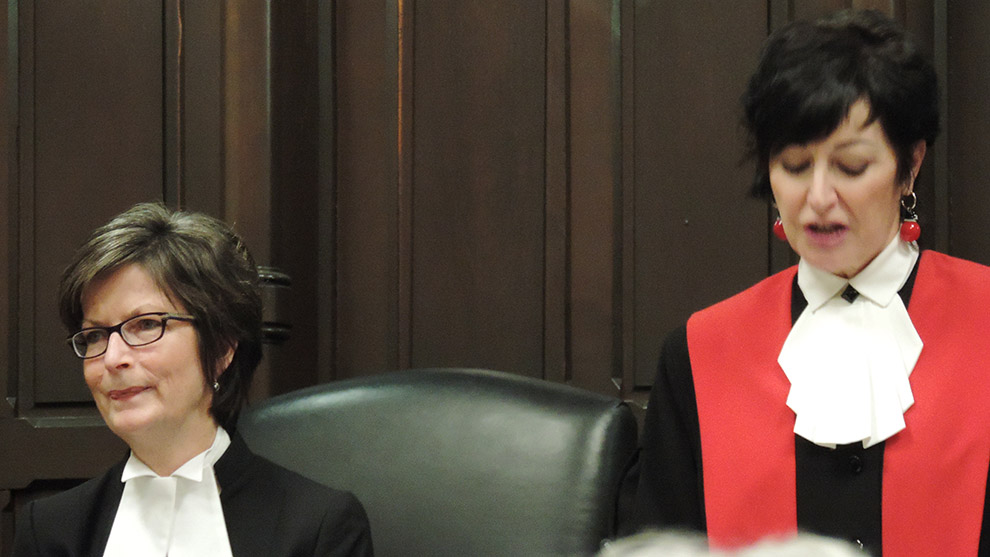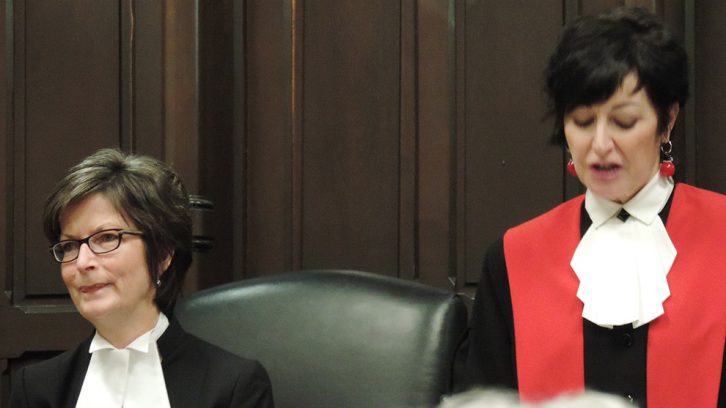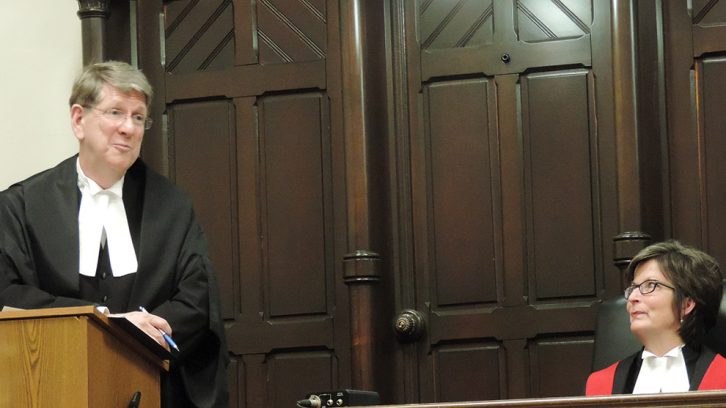Law
Welcome ceremony for Judge Ann Marie Simmons marks gender parity
Simmons is 18th woman out of 35 full-time judges in Nova Scotia provincial and family courts

caption
Chief Judge Pamela Williams (left) introduces newest judge Honourable Ann Marie Simmons (right) before she is robed in red.
caption
Chief Judge Pamela Williams (right) introduces Ann Marie Simmons (left) before she receives her red robes.Tears and laughs were shared Friday afternoon at Halifax provincial court as Ann Marie Simmons was welcomed as the eighteenth female full-time Nova Scotia provincial judge.
“Those of us who are fortunate enough to be born in loving and supportive families, we can explore our interests, we can achieve our goals,” said Simmons. “The fact that this ceremony takes place in this courtroom, in this building, where every day we deal with people who simply haven’t been as lucky as we have, I appreciate that.”
Family, friends, other provincial judges and Lt.-Gov. Arthur J. LeBlanc watched Simmons’ swearing-in ceremony, which included receiving her red robe. She was appointed in October to fill the vacancy left when Judge William Digby retired to part-time status.
For the first time, there is gender parity of judges in the Nova Scotia provincial and family courts. Eighteen of the 35 full-time judges are women. Related stories
“I am proud to say that for the first time in Nova Scotia, there are more female than male judges presiding full time in the provincial and family courts,” said Chief Judge Pamela Williams. “That is an incredible achievement in a profession that has been traditionally dominated by men.”
Simmons is the former bilingual chief federal prosecutor with the Public Prosecution Service of Canada. Originally from Cape Breton, she grew up in Ottawa with five siblings. A lawyer for 31 years, she has covered criminal prosecutions, including money laundering, organized crime, sexual assault and homicide cases.
Simmons has also worked at Dalhousie’s Schulich School of Law.
“As good of an advocate she is, she is an even better teacher,” said Roger Burrill, criminal counsel at Nova Scotia Legal Aid Commission. He shared teaching roles with her at the law school.

caption
Michael MacDonald welcomes Simmons as a provincial court judge.Williams facilitated the public ceremony, describing Simmons as a good friend who has always been “fair, courteous, respectful, and a hard-working advocate.”
“It’s an exciting time, really worth celebrating,” said Sarah Baddeley, chair of Women’s Legal Education and Action Fund Halifax. She said while it is a historic moment to reach gender parity in the Nova Scotia provincial and family courts, there is still work to be done. This includes diversifying the benches at the Supreme Court.
Only six out of 20 full-time justices in the Nova Scotia Supreme Court are women.
“We shouldn’t need to have to justify equality,” said Baddeley in an interview with The Signal. “It is the basic premise of our legal system.”
“It’s not just about striving for equal number for men and women on the bench; we need to see a diversity of perspectives, we need to be seeing Indigenous, African-Nova Scotians and other racialized persons on the bench.”
Corrina Smiley, a victim support worker with the Mi’kmaw Legal Support Network, said it’s not about reaching gender parity itself, but the need for more trauma-informed and cultural competent judges.
For her, this begins at the law school level. When working at Dalhousie Legal Aid with lawyers, she found that only two out of 15 doing their clinic there understood these concepts.
“The others were completely oblivious,” she said.
Smiley works on a regular basis alongside lawyers and Crown attorneys. She said from her experience in the courtroom, lawyers and judges may know the law, but often lack cultural competency of the person’s situation. She said lawyers and judges using the right language for people on the stand helps to make informed decisions.
About the author

Karli Zschogner
Karli Zschogner is part Nova Scotian and recently moved to Halifax for Journalism at the University of King's College. After her Bachelors in...

J
Jim Lavery